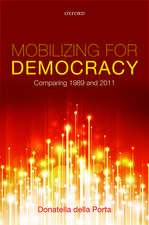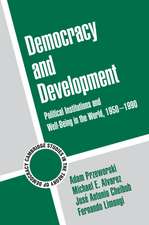Meeting Democracy: Power and Deliberation in Global Justice Movements
Editat de Donatella Della Porta, Dieter Ruchten Limba Engleză Paperback – 31 dec 2014
| Toate formatele și edițiile | Preț | Express |
|---|---|---|
| Paperback (1) | 284.98 lei 6-8 săpt. | |
| Cambridge University Press – 31 dec 2014 | 284.98 lei 6-8 săpt. | |
| Hardback (1) | 695.06 lei 6-8 săpt. | |
| Cambridge University Press – 16 ian 2013 | 695.06 lei 6-8 săpt. |
Preț: 284.98 lei
Nou
Puncte Express: 427
Preț estimativ în valută:
54.55€ • 59.27$ • 45.85£
54.55€ • 59.27$ • 45.85£
Carte tipărită la comandă
Livrare economică 21 aprilie-05 mai
Preluare comenzi: 021 569.72.76
Specificații
ISBN-13: 9781107484269
ISBN-10: 110748426X
Pagini: 288
Ilustrații: 4 b/w illus. 26 tables
Dimensiuni: 151 x 228 x 13 mm
Greutate: 0.39 kg
Editura: Cambridge University Press
Colecția Cambridge University Press
Locul publicării:New York, United States
ISBN-10: 110748426X
Pagini: 288
Ilustrații: 4 b/w illus. 26 tables
Dimensiuni: 151 x 228 x 13 mm
Greutate: 0.39 kg
Editura: Cambridge University Press
Colecția Cambridge University Press
Locul publicării:New York, United States
Cuprins
1. Power and democracy in social movements: an introduction Donatella della Porta and Dieter Rucht; 2. A methodology for studying democracy and power in group meetings Christoph Haug, Dieter Rucht and Simon Teune; 3. Types and patterns of intragroup controversies Dieter Rucht; 4. Patterns of participation Clare Saunders and Christopher Rootes; 5. Power and arguments in global justice movement settings Massimiliano Andretta; 6. Emotions in movement Donatella della Porta and Marco Giugni; 7. Quality of deliberation: a multilevel analysis Marco Giugni and Alessandro Nai; 8. Structurelessness: an evil or an asset? A case study Christoph Haug and Dieter Rucht; 9. Power and democracy: concluding remarks Donatella della Porta and Dieter Rucht; Appendices.
Recenzii
'With but a few notable exceptions, scholarship on social movements reflects an outsider's perspective. But in this exceptional collection, the contributors take us inside global justice groups to describe and analyze the movements' unique brand of participatory democracy. The result is as rich an empirical portrait of the internal dynamics of a movement as has been produced to date.' Doug McAdam, Stanford University
'In this truly ambitious project, the authors set out to provide an inside look at decision making in the global justice movement - using fine-grained discourse analysis and participant observation of countless meetings in twelve organizations in six countries. The result is not only a fascinating picture of what movement democracy looks like today, but also new insight into enduring questions about the conditions for equality in talk, the role of emotions in strategic decision making, and the possibilities of deliberative democracy in the here and now. A signal achievement.' Francesca Polletta, University of California, Irvine
'Revelatory. We really have learned something since the sixties. With incisive descriptions, interviews, and unsentimental analysis, this book takes you into GJM meetings, through controversy and concord, to demonstrate in concrete detail not only how hot-headed, dismissive and unconsciously exclusionary, but also - and more dominantly - how inclusive, mutually respectful, and deliberatory these new institutions and activists can be.' Jane Mansbridge, Harvard University
'In this truly ambitious project, the authors set out to provide an inside look at decision making in the global justice movement - using fine-grained discourse analysis and participant observation of countless meetings in twelve organizations in six countries. The result is not only a fascinating picture of what movement democracy looks like today, but also new insight into enduring questions about the conditions for equality in talk, the role of emotions in strategic decision making, and the possibilities of deliberative democracy in the here and now. A signal achievement.' Francesca Polletta, University of California, Irvine
'Revelatory. We really have learned something since the sixties. With incisive descriptions, interviews, and unsentimental analysis, this book takes you into GJM meetings, through controversy and concord, to demonstrate in concrete detail not only how hot-headed, dismissive and unconsciously exclusionary, but also - and more dominantly - how inclusive, mutually respectful, and deliberatory these new institutions and activists can be.' Jane Mansbridge, Harvard University
Descriere
An innovative study of the internal practices of deliberation and democratic decision-making in twelve Global Justice social movement groups.


















